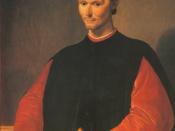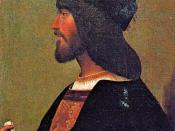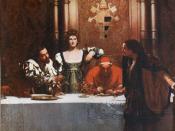During the renaissance there were many new ideas and philosophies about politics and government that started being established, none more important than Niccolo Machiavelli's The Prince. What Machiavelli did was analyze past rulers and present rulers of his time period and create a manual for leadership. His ideas would spread all throughout Europe as a radical and revolutionary way on how to gain and maintain power, because to Machiavelli, great does not mean morally good. One cannot be a morally good leader if you are planning to be a considered a great leader (7). As exemplified in his book several Rulers of his time period like Charles V, Louis XII of France, and Cesare Borgia tried to adopt his philosophies and use them in an effort to strengthen and maintain their political status. These rulers attempted to model their monarchies and empires off of Machiavellian principles, some were successful while others failed miserably.
Many people thought that Charles V was innocent of Machiavellian politics and as a man of "absolute moral rectitude," however the facts would point to several conclusions (3). Charles V lived at a time of change, during the pinnacle of the Protestant Reformation. He spent his life trying to deal with this problem. Emperor of the Holy Roman Empire, he was considered to be a ruler who was not respected because he kept the papacy weak and infirm. He had great difficulty in suppressing new religious ideas such as Lutheranism, and thus greatly weakened the influence of Catholicism in Western Europe. While Charles tried to live by the Machiavellian principalities, his failure to stop civil war, especially within Germany ultimately proved fatal. Machiavelli warns that a prince who is unable to prevent civil war will never gain honor, especially among his advisors (7). The pope, as...


